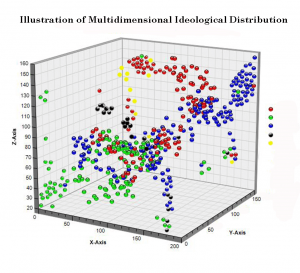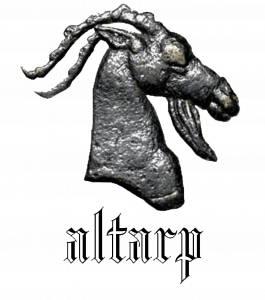Pick your Label
We at AltARP consider our philosophy as Libertarian Conservative. Add to that the adjective “skeptical” so we are skeptical libertarian conservatives. We welcome debate within the parameters of the definition on libertarianism:
One of the debates is about negative liberty versus positive liberty. Perhaps there is no rational debate about positive or negative liberty, which is just a manifestation of skepticism, about which there is robust debate.
The Great RIGHT-LEFT Divide
Language shapes our perception of reality. As a key component of our cultural heritage, language allows us to define who we are and who those other people are. Currently few words are as politically charged as “left” and “right” unless it is alt left and alt right, even though we have no idea who those alt people really are. What is obvious is that alt does not mean alternative, as it does for us, alternative arp. They are not an alternative to right or left, Liberal or Conservative because there is no single definition of what any of these terms means. We also reject the notion that right and left represent a continuum, with the good people on the right or left and the bad people on the left or right. We also are cautious about carelessly using the words bad or good, although linguistic economy requires such simple comparisons.
The alt right and left folks, for the most part appear to be a small number of people experiencing an existential crisis. The young ones will probably abandon the venture when they become employed full time. They may claim the extreme ends of a political spectrum, but there really is no spectrum from left to right. A better model might be a two or three multi-axis distribution chart with individuals self-identifying with various causes and beliefs that tend to change during their lives.

Politically, the terms right and left are generally believed to have come into common usage during the French Revolution, when monarchists (conservatives) sat on the right side in the National Assembly while the revolutionaries sat to the left. Wikipedia provides an interesting discussion of the subject titled “Left-right political spectrum.”
Preference for right-handedness dates to the ancient Egyptians, Greeks, and Romans, among many others. (http://www.rightleftrightwrong.com/history_ancient.html)
The symbolism of right and left has evolved throughout the ages. The righteous sit on the right hand of God. The guest of honor (Honour for our British brothers and sisters) at a banquet sits at the right hand of the host. The coat of arms of the United States is an Eagle facing to its right, olive branches (peace) clutched in its dexter (right) talon, while (whilst) the sinister (left) talon clutches thirteen arrows, presumably instruments of war, death, and destruction. Or are the arrows a symbol of our natural right to self-defense (defence)?
What does the word sinister mean to the average English language speaker? To a Roman it meant “left” while dexter signified the direction to the “right.” Yes, we think the political left is sinister in case there is any doubt. The political left are socialists, communists, and recently “progressives.” We will give Bernie supporters a pass for calling themselves progressive because they are still learning to feed themselves.
In the Spanish world izquierdistas (leftists) are people who identify with the political left (izquierda política) and while their self-proclaimed ideology advocates equality for all people, the practical effect in countries where the political left has taken hold are governments run by the political elite. Little improves for the people. Venezuela, a country rich in natural resources, has been brought to the brink of insolvency by its leftist government.
So right and left are terms that divide us if we are not careful to define what the terms mean in our own time.
We become slaves to our cultural inheritance and that includes our own subjective definitions of right and left, Conservative and Liberal (Capital C and L), and which one is good or bad.
Conservative versus Liberal
These two labels separate people today but both are ill defined and have meant different things throughout the ages. Certainly those who sit on the right hand of God are Conservatives, eager to prove their righteousness. Conservatives during the age of Monarchs fought for preservation of the monarchy and politically conservative American colonists were not eager to rebel against good King George III.
Classical liberalism emerged as a political movement during the Age of Enlightenment. Liberals during the French Revolution demanded the natural right to life, liberty, and property and proceeded to destroy the prevailing order, resulting in ten years of political turmoil followed by a dictatorship under Napoleon. Then the brothers of Louis XVI were restored to the throne, which evolved into a constitutional monarchy. Eventually the liberal opposition, undoubtedly reinforced by a terrible economic downturn, got rid of the conservative Bourbon king.
Today Saudi Conservatives support the Saudi monarchy but American Conservatives bond with their so-called Liberal brothers (and sisters) to question why such an anachronistic institution as a monarchy still exists. Conservatives and Liberals alike ask the question if people in the Middle East, by virtue of their culture and other such baggage can be trusted with self-governance. Do they require a theocracy as in Iran? Does Syria need Assad to hold the country together to assure protection for minorities? Was it a mistake to topple Kaddafi and Saddam Hussein? Do the prisoners at Attica Prison require a warden?
The American Revolution against England was a conservative argument for the rights of the colonists as British subjects. Colonial Conservatives were seeing no results from their assertion of rights as British subjects so they asserted classical liberal Enlightenment principles of consent of the governed and natural rights to declare their freedom from the crown and parliament. They created a republic, not a democracy. Some loyalists who disagreed with their Colonial leaders fled to England. Others were persecuted, jailed, hanged, and their property confiscated or destroyed.
The people who started the revolution remained in power after the revolution. Their colonial legislatures became state legislatures. By today’s standards, they were all very conservative. They understood and accepted the existence of a social contract among the people, the Constitution of the United States.
Was our beloved Republican American president, Abraham Lincoln, a Conservative or Liberal? He certainly was at odds with Conservative big D Democrats who supported slavery.
There is little doubt that religious conservatism held sway during those revolutionary times, yet many of our founding fathers were anything but conservative Christians. Some, like Thomas Jefferson, George Washington and Benjamin Franklin were avid adherents to the ideas of the European Enlightenment. Were they Deists? Religion is another argument that separates people.
Thomas Paine, a philosopher of the American Revolution, was rejected by the young nation after the revolution because of his liberal religious views and he is only occasionally counted among the Founding Fathers. He was a classical small “l” liberal, a freedom loving patriot, and for a while being a freedom loving patriot was popular. After the revolution his usefulness waned and for several hundred years he was scorned by big “C” Conservatives, many of whom were big “D” Democrats.
When Ronald Reagan accepted the Republican nomination for president in 1980, he invoked God and invited Americans to help him in a “crusade to make America great again” and in doing so he also invoked the words of Thomas Paine from his 1776 pamphlet Common Sense: “We have it in our power to begin the world over again.” Obviously Conservatives can be revolutionaries as well as what we now call Leftists.
Are you ready to declare your political label?
Many of us have a label that we inherited from our family, while some adopt a new label during a time of adolescent rebellion. Many of us change gradually as we age.
Try taking this informative on-line quiz from Advocates for Self-Government. The Advocates is a credible source to explore Libertarian ideas. Later we will explore other adjectives that Real Conservatives may append to the label “Conservative.”
Access the quiz HERE
